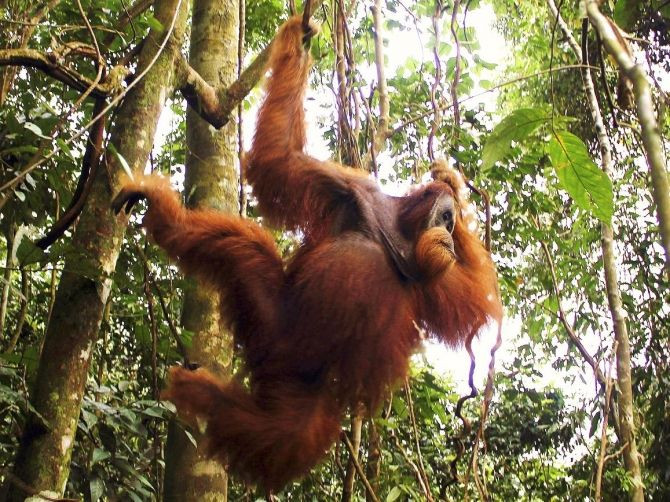Orangutans Can Delay Puberty for Up to 10 Years to Be More Attractive

New evolutionary research has revealed that orangutans are able to delay puberty for up to ten years until they are more attractive and strong enough to fight off stronger males.
Male orangutans can generally reproduce when they reach 15 years of age, but it’s not until they develop secondary sexual characteristics like cheek flanges on their face and increased muscle mass that they are able to successfully attract females.
The orangutans on Sumatra, in the Indonesian islands, are the only primates to have managed this clever evolutionary trick that stops the growth of secondary sexual characteristics, not even neighboring Bornean orangutans have managed to hold off sexual maturity, according to researchers from the University of South Florida.
Other characteristics that males delaying puberty wait for include growing longer hair on their arms or back and developing larger throat pouches that allow them to make longer mating calls.
Gauri Pradha and her colleagues found that unlike Bornean males, Sumatran males can monopolize the attention of all surrounding females for weeks at a time.
Researchers suggest, in their study published in The American Journal of Anthropology, that the two different type of adult males, ones with secondary sex characteristics and those without, have evolved two different mating strategies over time.
Based on mathematical data, Pradha and her team saw a correlation between the mating habits of the group and arrested development.
They found that troops where only a few dominant males controlled all the females had more incidents of orangutans delaying their development up until they had enough strength to oust the dominant males.
After deposing the dominate males, they would quickly reach sexual maturity and monopolize surrounding females for weeks at a time.
Additionally, researchers noted that orangutans that had matured later were also significantly more successful than other males in gaining exclusive access to the females.
It is still unclear as to how orangutans are able to control their own growth, and if delayed puberty is a conscious decision or otherwise.
While there are reproductive benefits to delayed puberty, researchers note that there is a strong link between delayed sexual maturation and early deaths.
“Pronounced developmental arrest is linked to very low adult mortality, which explains why it is so limited in its taxonomic distribution,” they concluded.



























